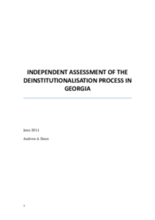UNICEF; the Ministry of Education and Science; the Ministry of Labour, Health and Social Affairs, EveryChild; Save the Children and the Children of Georgia commissioned an independent assessment of the deinstitutionalisation of children in Georgia in March and April 2010. The independent assessment examined, specifically, the deinstitutionalisation of children in special education boarding schools and child care institutions. Through interviews with key informants, children who had been reintegrated into communities, and children in foster care as well as visits to small group homes, child care institutions, special education facilities, and social service agency offices, the research team uncovered several key findings.
The report notes that the use of institutional care had been less widespread in Georgia than in neighboring countries and that the country had already made significant strides in reducing the number of children in institutional care from about 5,000 in 2005 to 1,200 in 2009. Those children that are remaining in child care institutions are those who have been found to be “difficult to place,” including those in need of special services for lack of inclusive education in public schools. One of the improvements in the deinstitutionalisation process identified by the report is that the Ministry of Education and Science had decided to shut down five poorly functioning schools and to limit admission to special education schools only to those children who were notably in need of special services. However, some of these schools were closed against the recommendation of local NGOs and the quick closure of the schools meant that schools and NGOs were not well prepared to reintegrate children properly and thoroughly into families and communities.
Overall, the research team found that Georgia was making progress in the deinstitutionalisation of children. “Out of 863 children who were assessed,” says the report, “only 441 of these children remain in the institutions.” Additionally, five boarding schools and two child care institutions have been closed. Among the recommendations from the research team, the report suggests that the information and case management systems need updating, that foster care and small group homes be made more available, and that more emphasis be placed on family support services and prevention going forward.

